|
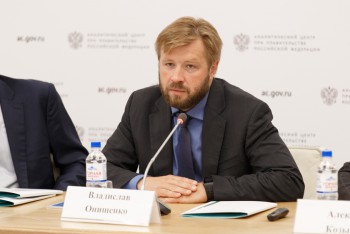 Representatives of governmental authorities, business sector, civil
society, scientific and educational communities (about 100 people) participated
in the Roundtable. The Institute of the Information Society was represented by Dr.
Yuri Hohlov, Chairman of the Board of Directors, Tatiana Ershova, General
Director, Sergei Shaposhnik, Head of Directorate for Monitoring Information
Society Development and Louisa Rizmanova, Director of the Department for
International Cooperation and Public Relations. Representatives of governmental authorities, business sector, civil
society, scientific and educational communities (about 100 people) participated
in the Roundtable. The Institute of the Information Society was represented by Dr.
Yuri Hohlov, Chairman of the Board of Directors, Tatiana Ershova, General
Director, Sergei Shaposhnik, Head of Directorate for Monitoring Information
Society Development and Louisa Rizmanova, Director of the Department for
International Cooperation and Public Relations.
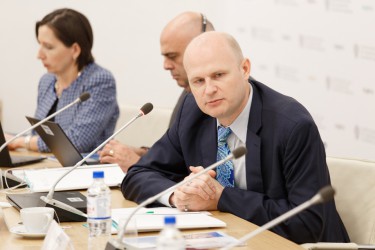 Vladislav Onishchenko, First Deputy Head of the Analytical Center welcomed
participants of the Roundtable. Opening the event, he noted that, undoubtedly, the
development of the digital economy is important and topical issue and, it is
necessary to understand what measures should be taken to in this direction. Vladislav Onishchenko, First Deputy Head of the Analytical Center welcomed
participants of the Roundtable. Opening the event, he noted that, undoubtedly, the
development of the digital economy is important and topical issue and, it is
necessary to understand what measures should be taken to in this direction.
Then Oleg
Petrov, Senior Program Coordinator of the World Bank delivered his welcoming
speech to the participants.
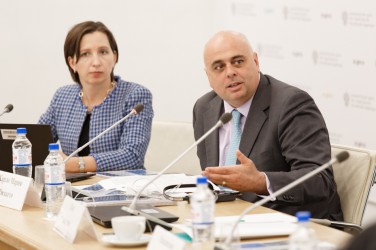 Carlo Maria Rosotto, Leading
ICT Specialist and Coordinator of the Regional Programs of the World Bank, made
the presentation of the draft Digital Economy Country Assessment (DECA). Carlo Maria Rosotto, Leading
ICT Specialist and Coordinator of the Regional Programs of the World Bank, made
the presentation of the draft Digital Economy Country Assessment (DECA).
The following experts took
part in the discussion:
- Dr. Sang-Baek Chris Kang,
Director Of Global Cooperation, Korea Local Information Research And
Development Institute (KLID, South Korea);
- Gwanhoo Lee, Professor of Information
Technology, American University (USA-Korea); Kim Andreasson, Managing Director
of DAKA Advisory (Sweden) and Rafal Rohozinski, Co-founder and Director of
SecDev Group (Canada).
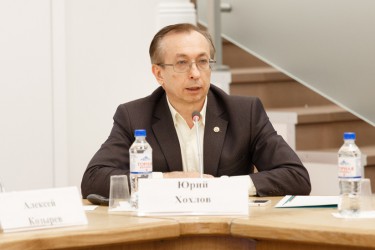 As Alla Morrison, Digital
Development Specialist of the World Bank's Economic Development Group, told, it
is necessary to assess the readiness for the digital economy for several
reasons: due to the rapid development of a new generation of transformational
digital technologies, availability of various reports and tools for individual
sectors, different stages of the maturity of the digital economy in countries. As Alla Morrison, Digital
Development Specialist of the World Bank's Economic Development Group, told, it
is necessary to assess the readiness for the digital economy for several
reasons: due to the rapid development of a new generation of transformational
digital technologies, availability of various reports and tools for individual
sectors, different stages of the maturity of the digital economy in countries.
Dr. Yuri Hohlov, Chairman of the
Institute of the Information Society noted that the Methodology is also aimed
at assessment of the country's digital economy maturity, identification of key
gaps, problems and opportunities, as well recognition of key areas that can boost
national economic growth. He stressed that the methodology includes three main
components: assessment of readiness of key foundations for the development of
the digital economy, conduction a comparative analysis of the current state-of-the-art
and assessing the impact on socio-economic development.
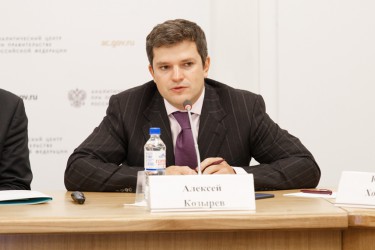 Within the second session of
the Roundtable the intermediate results of the analysis of Russia's readiness Within the second session of
the Roundtable the intermediate results of the analysis of Russia's readiness
Alexey Kozyrev, Deputy
Minister of Telecom and Mass Communications of the Russian Federation, who leaded
elaboration of the Draft Program "Digital Economy" in accordance with
the instructions of the President of the Russian Federation, addressed the
participants of the discussion.
Further, the detailed analysis
of Russia’s readiness for the digital economy were considered by specific
areas, such as “State Policy and Strategic Planning”, “Leadership and
Institutions”, “Legislation, Regulation and Standards”, “Human Capital”, “Digital
Infrastructure”, “Digital Health”, “Digital Education” and “Digital Culture” etc.
and there was brainstorming discussion during which participants provided their
comments and proposals on the improvement of the methodology.
Roundtable Agenda |

